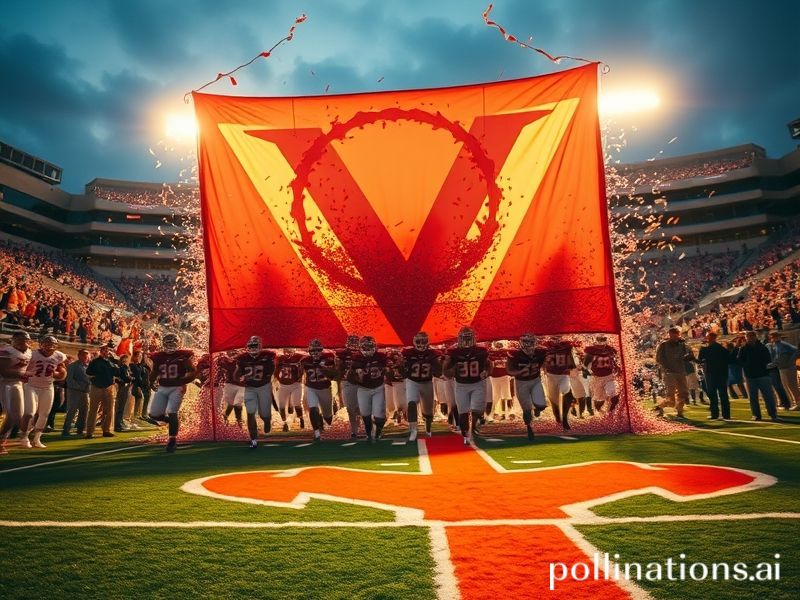Virgina Football: How One Missing Letter Became a Global Phenomenon
A Dispatch from the Commonwealth: “Virgina Football” and the End of Global Innocence
By L. Valenti, International Correspondent at Large
Dateline: Somewhere over the Atlantic, Wi-Fi sputtering like a third-tier referee’s whistle.
It began, as all modern scandals do, with a typo. Somewhere between a hastily drafted press release and the algorithmic digestive tract of social media, the University of Virginia’s storied Cavaliers were rechristened “Virgina Football,” a consonant short of dignity and two letters shy of basic anatomical accuracy. Within minutes, the misspelling was trending worldwide—Tokyo salarymen snickered over midnight ramen, Lagos meme lords minted NFTs of anatomically confused citrus fruit wearing helmets, and a Swiss bank briefly listed “$VGNA” as an emerging-market currency. In the grand scheme of planetary collapse, it was barely a hiccup. But hiccups, as any drunk philosopher will tell you, reveal the diaphragm of the world.
The University’s communications office issued a 47-word correction that was itself misspelled, thereby proving both Murphy’s Law and the Dunning-Kruger effect can share a dorm room. By then, the damage was global. Russian state television ran a segment suggesting the typo was a CIA psy-op designed to make Commonwealth residents forget how to spell “Virginia,” while Chinese social-media censors quietly deleted posts asking whether “Virgina” was the new “Silicon” Valley. Somewhere in Brussels, an EU linguistic task force convened an emergency Zoom to determine if the slip constituted a micro-aggression against the Latin alphabet. They adjourned without consensus but agreed the pastries were sub-par.
On the ground in Charlottesville, the Cavaliers—still unsure whether they were playing for a state or a gynecological euphemism—took the field against William & Mary. ESPN’s international feed helpfully translated “Virginia” into 27 languages, none of which could render “Virgina” without triggering parental controls. The game itself was the usual collegiate ballet of concussive physics and unpaid labor, ending 27-13. The real action, however, played out on the sidelines, where a rogue corporate partnership announced the launch of “Virgina is for (Fantasy) Lovers,” a daily-fantasy app aimed at nations where betting on American amateur sport is somehow more ethical than paying the athletes.
Global markets responded with the sort of indifferent shrug usually reserved for UN climate reports. The Nikkei dipped 0.2% on rumors that the typo would delay a lucrative jersey-stitching contract in Phnom Penh. Bitcoin spiked 4%, because Bitcoin always spikes 4% whenever humanity embarrasses itself in public. Meanwhile, in Qatar—where next year’s World Cup will be played on the graves of better moral decisions—officials offered “Virgina” naming rights to an air-conditioned stadium, provided the university changed its fight song to a more Sharia-compliant key. Negotiations continue, mediated by a London PR firm that also represents Syrian rubble and at least two disgraced dukes.
Back home, American pundits tried gamely to frame the incident as a referendum on educational standards, forgetting that their own president once tweeted about “covfefe.” Cable panels dissected the missing “i” with the forensic intensity usually reserved for ballistic trajectories in Eastern Ukraine. Lost in the noise was the simple truth that technology now allows a single sleepy copywriter in Roanoke to dent the global zeitgeist before breakfast. If that doesn’t terrify you, congratulations—you’ve already been reincarnated as a brand ambassador.
Yet amid the farce, a quieter migration unfolded. International students from Senegal to Sri Lanka, previously unaware that American universities fielded football teams at all, suddenly Googled “Virgina scholarships.” Admissions offices reported a 38% uptick in applications from countries where English is a second, third, or aspirational language. Somewhere in an Accra cyber-café, a teenager practiced typing “University of Virgina” over and over, determined to nail the mistake that might nail him a future. The typo, in other words, became a portal—warped, ridiculous, but still a door.
And so the world spins on, lubricated by typos, typos lubricated by us. Climate refugees keep walking, oligarchs keep yachting, and somewhere a football team still can’t spell its own home. But if you listen closely, you can hear the planet’s collective autocorrect clearing its mechanical throat, preparing to replace humanity with something that at least runs a spell-check before kickoff.
Conclusion: The “Virgina” incident will be forgotten by next news cycle, archived next to the gorilla in the Cincinnati zoo and that Icelandic volcano nobody can pronounce. Yet for one gleaming moment, the Commonwealth managed to unite the globe in juvenile giggling—a small, misspelled reminder that in the twenty-first century, even failure goes viral. And that, dear reader, may be the most honest touchdown we’ve scored all year.







